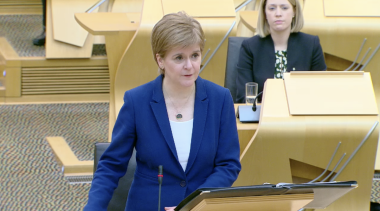Nicola Sturgeon vows legal action after PM moves to block Scotland's gender identity reforms

Scotland's First Minister Nicola Sturgeon is planning to take legal action after Rishi Sunak blocked controversial gender reforms.
Plans approved by Scottish ministers just before Christmas will allow 16 year olds to change their legal gender and remove the need for a medical diagnosis of gender dysphoria.
The Gender Recognition Bill will also shorten the length of time to receive a gender recognition certificate from two years to just three months - or six months for 16 and 17 year olds.
Scottish Secretary Alister Jack, acting with the Prime Minister's approval, has written to the First Minister declaring his intention to veto the Bill.
In his letter, he warned of "chilling effects" on female-only spaces across a range of places, including clubs and schools.
The letter also foresees "significant complications" if Scotland and England have different legal frameworks for gender recognition, potentially allowing someone to be male in one country and female in the other.
In a statement to Parliament on Tuesday, Mr Jack said he would make an order under section 35 of the Scotland Act 1998 preventing the Bill from proceeding to Royal Assent.
Responding to the intervention, Ms Sturgeon accused Westminster of a "full-frontal attack" attack on the Scottish Parliament.
"This is a full-frontal attack on our democratically elected Scottish Parliament and it's ability to make it's own decisions on devolved matters," she said.
"[The Scottish government] will defend the legislation & stand up for Scotland's Parliament. If this Westminster veto succeeds, it will be first of many [sic]."
The Christian Institute and Scottish Catholic bishops have both called for the legislation to be scrapped.
In a statement last month, the bishops said, "We are gravely concerned about the changes proposed by the Scottish Government's Gender Recognition Reform (Scotland) Bill."
"The bill introduces a system of self-identification, allowing a person to change their legal sex without the need for a medical diagnosis of gender dysphoria or having to consult a doctor.
"Removing this requirement and denying the important medical oversight that goes with it will inevitably reduce the opportunity for crucial health care, support, and protection for vulnerable individuals, including children."











